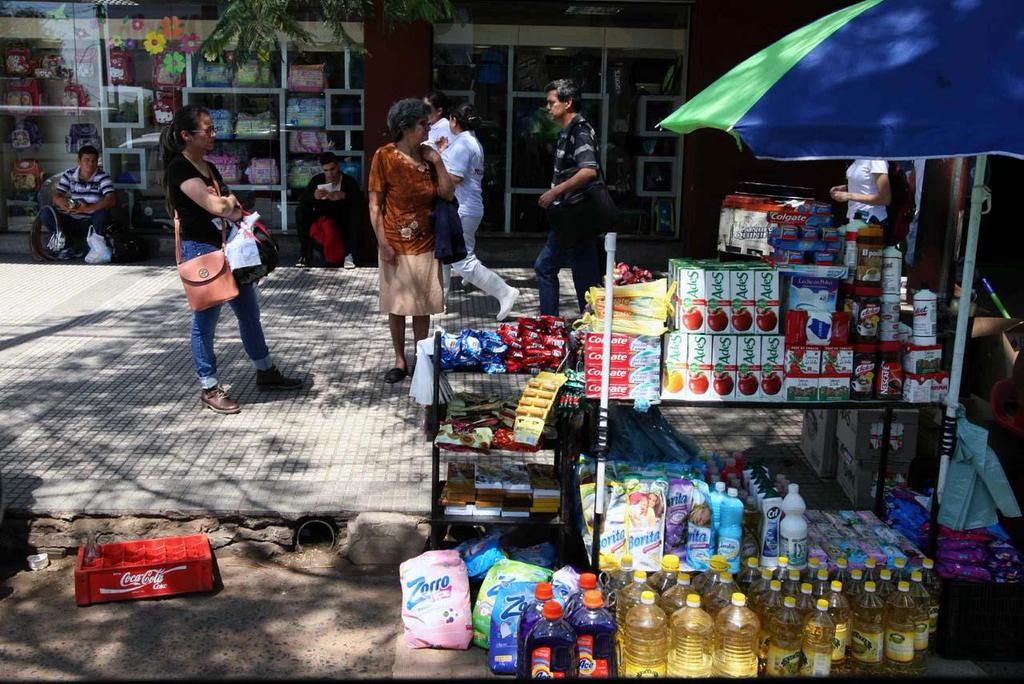
EspañolOver the past few years in Paraguay, the business sector has pressured the government to protect local industries from foreign products. In September, the Paraguayan Industrial Union launched a brand new “anti-smuggling campaign” to try to encourage Paraguayans to buy local products instead.
Yet, amid a worsening economic crisis in Argentina, the Paraguayan guaraní almost triples the Argentinean peso in value. This has made importing products a very lucrative business. On weekends, thousands of citizens from Asunción and nearby cities travel less than 30 miles to Clorinda, Argentina, to buy a month’s worth of groceries.
Those who are not able to make the trip can still purchase the same Argentinean goods right around the corner, or while waiting in traffic, where street vendors offer everything from fruits and vegetables to cooking oils, coffee, and powder detergent at prices up to 50 percent lower than in supermarkets.
The governments of both nations have strengthened border controls to prevent this form of commerce, which offers them little to nothing in tax returns. For example, the Argentinean city of Posadas built a wall at the edge of a river that separates it from Encarnación, Paraguay.
For its part, the Horacio Cartes administration has stepped up controls, seizures, and fines along the border, and has imposed regulations to discourage small-scale importers, who regularly organize protests to denounce these legal barriers. As if that weren’t bad enough, the Ministry of Industry Commerce is now requiring more taxpayer money to suppress this free trade.
Nicolás Morás is an Argentinean journalist and a prominent left-libertarian activist in the region. In 2013, he acted as an advisor to the merchants who demonstrated against the tariffs that the Cartes administration sought to impose.
Morás sat down with the PanAm Post to discuss the reasons behind these anti-smuggling campaigns.
When did this latest wave of smuggling between Paraguay and Argentina start and why?
It’s hard to pinpoint a date. The dramatic devaluation of the Argentinean peso resulting from the government’s currency controls, in place since 2012, was definitely a factor. This made certain Argentinean products cheaper, while also destroying the local consumer’s purchasing power.
In contrast, electronics and several other goods are more affordable in Asunción or Ciudad del Este, where importing is easier and the value-added tax (VAT) is only 10 percent, versus 21 percent in Argentina. Plus, border crossings are always the perfect stage for smugglers, and it better stay that way.
Who are the paseros and how does their border trade work?

They are people whose job is to smuggle products for their clients from one side of the border to the other, eluding customs regulations.
They carry out their trade with absolute ease, and just like any other activity under a regime of free competition, they possess a great deal of professional integrity.
Which groups are pressuring the authorities to obstruct commerce?
Without a doubt, those who have an interest in dominating the market: certain companies from both countries.
One that stands out is the Grupo Vierci conglomerate in Paraguay. Their firms benefit from tax exemptions and other perks to supply their department stores with imported goods, while their media department peddles propaganda against smugglers on national TV and radio.
Is the propaganda effective on public opinion?
Protectionist propaganda always appeals to two basic rhetorical tactics: the nationalist instinct and the defense of local jobs. The latter tactic sparks in people’s minds the fear of losing their jobs, a complete fallacy disproved by Frédréric Bastiat two centuries ago.…
Most importantly, two centuries plagued with failed protectionist experiences is more than enough of a lesson, don’t you think?
Free trade benefits the people and damages the ruling class. I believe that in these matters, Paraguayans have been smarter than Argentineans, and therefore, they enjoy more liberties.
Paraguayan businesses claim that the currency devaluation promotes unfair competition, but wasn’t Mercosur supposed to eliminate barriers to trade anyway? Are customs regulations beneficial at all?
Precisely, the devaluation of the Argentinean currency was involuntary; it has nothing to do with improving the competitiveness of exporters, and everything to do with the awful tax management of the Cristina Kirchner administration. In contrast, the current devaluation of the guaraní does pursue that goal, along with that of the Brazilian real.
What is actually unfair is to use taxes as a mallet to crush competition, to sell lesser quality products at a higher price, and turn buyers into hostages. The benefit of customs (and also certain types of devaluation) comes down to a higher profit for industrialists, and of course, for their political buddies.
Contrary to prejudiced beliefs spread by anti-liberal intellectuals — or worse, pseudo-liberals — free trade makes the accumulation of wealth by the few more difficult.
By the way, Mercosur is nothing but a sham that has little to do with its stated goals. It was custom designed by two protectionist tyrants, Brazil and Argentina.
Do you mind the use of the term “smuggling” to refer to free trade?
It doesn’t hurt my feelings. It is evident that the difference between smuggling and legal trade is just a bureaucratic whim. Trade equals mutual benefits, progress, and peace, always.
[adrotate group=”8″]
With the end of the Kirchner era, will the Argentinean economy, and therefore trade balance, return to normal?
It’s not certain that the Kirchner model, which has been patched up and made worse over and over again, will end [after the presidential election]. We have been wrong before in pronouncing it dead.
Even if this is the case, there are signs that there may be a return to the often mislabeled “neoliberalism”: privatizations among friends, public debt increases, fewer government handouts, and the occasional flirting with US investors.
This is equally true for presidential candidates Mauricio Macri, Daniel Scioli, and Sergio Massa. For a while, they will mend macroeconomic numbers and alleviate the regulatory burden on certain sectors at the expense of others. After 10 or 15 years, there will be another crisis, and we’ll be back where we started. It’s the recurring curse of South American politics.
The underlying problem is the statist model in all forms: the last pillar of obscurantism, oppression, and humanity’s ugliest face. In the words of the great Bastiat, the state is that great fiction by which everyone tries to live at the expense of everyone else. And it is up to us libertarians to change history, instead of being mere witnesses to it.
 Versión Español
Versión Español












